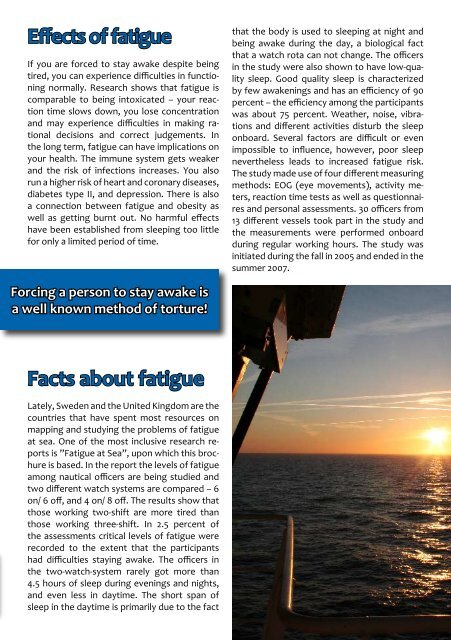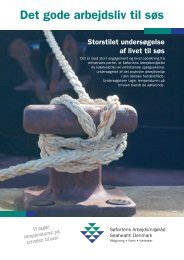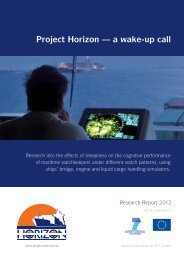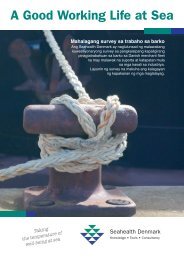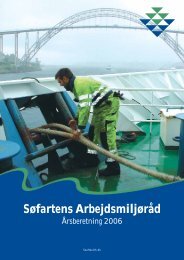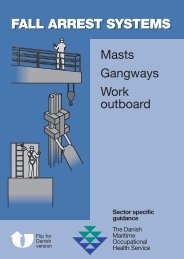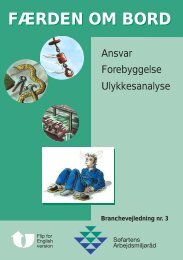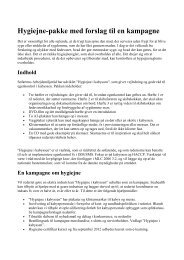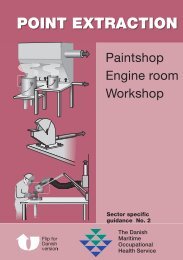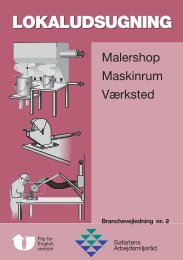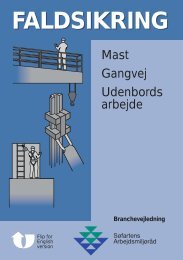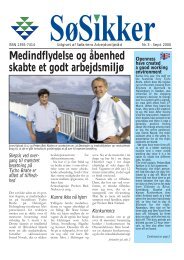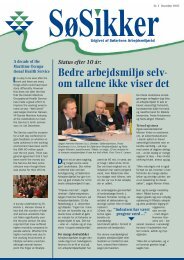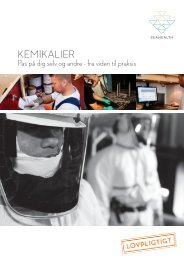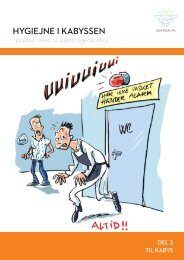Fatigue at Sea
Fatigue at Sea
Fatigue at Sea
- No tags were found...
You also want an ePaper? Increase the reach of your titles
YUMPU automatically turns print PDFs into web optimized ePapers that Google loves.
Effects of f<strong>at</strong>igue<br />
If you are forced to stay awake despite being<br />
tired, you can experience difficulties in functioning<br />
normally. Research shows th<strong>at</strong> f<strong>at</strong>igue is<br />
comparable to being intoxic<strong>at</strong>ed – your reaction<br />
time slows down, you lose concentr<strong>at</strong>ion<br />
and may experience difficulties in making r<strong>at</strong>ional<br />
decisions and correct judgements. In<br />
the long term, f<strong>at</strong>igue can have implic<strong>at</strong>ions on<br />
your health. The immune system gets weaker<br />
and the risk of infections increases. You also<br />
run a higher risk of heart and coronary diseases,<br />
diabetes type II, and depression. There is also<br />
a connection between f<strong>at</strong>igue and obesity as<br />
well as getting burnt out. No harmful effects<br />
have been established from sleeping too little<br />
for only a limited period of time.<br />
th<strong>at</strong> the body is used to sleeping <strong>at</strong> night and<br />
being awake during the day, a biological fact<br />
th<strong>at</strong> a w<strong>at</strong>ch rota can not change. The officers<br />
in the study were also shown to have low-quality<br />
sleep. Good quality sleep is characterized<br />
by few awakenings and has an efficiency of 90<br />
percent – the efficiency among the participants<br />
was about 75 percent. We<strong>at</strong>her, noise, vibr<strong>at</strong>ions<br />
and different activities disturb the sleep<br />
onboard. Several factors are difficult or even<br />
impossible to influence, however, poor sleep<br />
nevertheless leads to increased f<strong>at</strong>igue risk.<br />
The study made use of four different measuring<br />
methods: EOG (eye movements), activity meters,<br />
reaction time tests as well as questionnaires<br />
and personal assessments. 30 officers from<br />
13 different vessels took part in the study and<br />
the measurements were performed onboard<br />
during regular working hours. The study was<br />
initi<strong>at</strong>ed during the fall in 2005 and ended in the<br />
summer 2007.<br />
Forcing a person to stay awake is<br />
a well known method of torture!<br />
Facts about f<strong>at</strong>igue<br />
L<strong>at</strong>ely, Sweden and the United Kingdom are the<br />
countries th<strong>at</strong> have spent most resources on<br />
mapping and studying the problems of f<strong>at</strong>igue<br />
<strong>at</strong> sea. One of the most inclusive research reports<br />
is ”<strong>F<strong>at</strong>igue</strong> <strong>at</strong> <strong>Sea</strong>”, upon which this brochure<br />
is based. In the report the levels of f<strong>at</strong>igue<br />
among nautical officers are being studied and<br />
two different w<strong>at</strong>ch systems are compared – 6<br />
on/ 6 off, and 4 on/ 8 off. The results show th<strong>at</strong><br />
those working two-shift are more tired than<br />
those working three-shift. In 2.5 percent of<br />
the assessments critical levels of f<strong>at</strong>igue were<br />
recorded to the extent th<strong>at</strong> the participants<br />
had difficulties staying awake. The officers in<br />
the two-w<strong>at</strong>ch-system rarely got more than<br />
4.5 hours of sleep during evenings and nights,<br />
and even less in daytime. The short span of<br />
sleep in the daytime is primarily due to the fact


